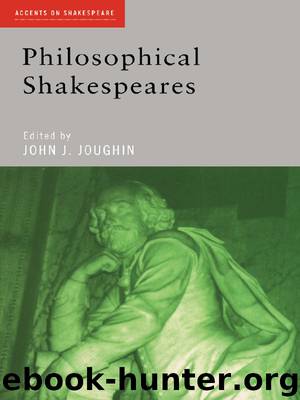Philosophical Shakespeares by Joughin John J

Author:Joughin, John J.
Language: eng
Format: epub
Publisher: Taylor & Francis Ltd
Published: 2011-07-13T16:00:00+00:00
Everything happens in the middle, everything passes between the two, everything happens by way of mediation, translation, and networks, but this space does not exist, it has no place. It is the unthinkable, the unconscious of the moderns.
(37, my emphasis)
Since modernity defines itself by the dual and mutually incompatible activities of ‘purification’ and ‘mediation’, its activities deny, even while fostering, the increasing production of ‘hybrids’: quasi-objects which cannot be cleanly located in the ‘purified’ realm of either the subject, or the object, poles of the modern Constitution.
What else is the Ghost in Hamlet but just such a hybrid, walking the ‘unthinkable’ realm between the separation of the object and subject poles? Presumably ‘really there’ in Act 1, its objective status is Verified’ by the fact that everyone present on the battlements sees it; however, later in III. iv., when Hamlet confronts Gertrude in her chamber, the Ghost’s reality is thrown into ontological crisis by the fact that only Hamlet can see or hear it. What exactly is the status of this Thing? Is it really there or not? Surely it is meant, at least in Hamlet’s mind, to function as a Vanishing mediator’, that element which ‘although nowhere actually present…nonetheless has to be retroactively constructed, presupposed, if all other elements are to retain their consistency’ (Žižek 1993:33). But the Ghost, as monstrous hybrid or ‘quasi-object’ (Latour 1993:51), fails to serve; what kind of ‘father’ is Hamlet supposed to ‘remember’? Here the incommensurability of ‘episteme’ with ‘historeme’ is painfully obvious, and guarantees that Hamlet’s charge to Horatio to tell ‘the occurents, more and less/Which have solicited’ (V. ii. 310) will never be realized.
The tenets, therefore, of so-called modernity cannot be maintained without the use of a ‘vanishing mediator’ to keep the divisions of experience in their respective places. Latour calls this mediator, which is at once disavowed and held in reserve, the ‘Crossed-Out God’ (1993:32–3): a functionally ‘sublime object’ which can be called back into the picture whenever there are equally weighted ideological disputes between the object and subject poles. In the absurd position of having to keep issuing the call for such place-holders and evincing the proper degree of cynical distance, the modern Constitution is a self-cancelling proposition, established and maintained only by a fetishistic disavowal of its own conditions of impossibility.
As we are now (arguably) at the fin de siècle of the new historicist regime, and are besieged by the banalities of ‘ever more minute refinements of the concept “postmodern”’ (Bewes 1997:47), perhaps the question we should be asking apropos of Hamlet’s dilemma is not (with all due respect to Carolyn Porter) ‘are we being historical yet?’, but are we being modern yet? For it is precisely in the space of a virtual modernity that Shakespeare pitches Hamlet’s tent. Hamlet, like any good ‘slacker’, is in search of a convincing reason to take up the paternal mandate; but of course, he can’t find a convincing reason to act because this isn’t really his job. Hamlet may lack advancement, but
Download
This site does not store any files on its server. We only index and link to content provided by other sites. Please contact the content providers to delete copyright contents if any and email us, we'll remove relevant links or contents immediately.
Still Me by Jojo Moyes(11258)
On the Yard (New York Review Books Classics) by Braly Malcolm(5525)
A Year in the Merde by Stephen Clarke(5424)
Eleanor Oliphant Is Completely Fine by Gail Honeyman(5276)
The Bookshop by Penelope Fitzgerald(3848)
How Music Works by David Byrne(3263)
Surprise Me by Kinsella Sophie(3110)
Pharaoh by Wilbur Smith(2989)
Why I Write by George Orwell(2948)
A Column of Fire by Ken Follett(2608)
Churchill by Paul Johnson(2579)
The Beach by Alex Garland(2560)
The Songlines by Bruce Chatwin(2552)
Aubrey–Maturin 02 - [1803-04] - Post Captain by Patrick O'Brian(2305)
Heartless by Mary Balogh(2258)
Elizabeth by Philippa Jones(2201)
Hitler by Ian Kershaw(2195)
Life of Elizabeth I by Alison Weir(2082)
Harry Potter and the Cursed Child by J. K. Rowling & John Tiffany & Jack Thorne(2061)
